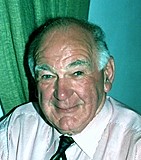 |
 |
THE TOWN'S MERCY MISSION
FORTY YEARS AGO
by Rex Needle
 |
 |
THE TOWN'S MERCY MISSION
FORTY YEARS AGO
by Rex Needle
|
THE HELP GIVEN by the people of Bourne during times of national need is well documented, mainly the establishment of a military hospital during the Great War of 1914-18 which treated 950 wounded soldiers from the trenches and the welcome given to 900 children evacuated from Hull to escape the bombing during the Second World War of 1939-45. But there was another lesser known occasion when volunteers from the town rallied to give support to those in need and that occurred forty years ago this month when General Idi Amin, president of Uganda, ordered the expulsion of the Indian minority, giving them 90 days to leave the country. His government claimed that they were hoarding wealth and goods to the detriment of indigenous Africans and therefore "sabotaging" the economy. The Indians lost their homes, businesses and all but a few possessions. Many were citizens of the United Kingdom and its colonies and had British passports and so looked to this country to offer them a safe haven. As a result, Britain took around 27,200 of them while thousands more went to other countries around the world. Their arrival in Britain was a massive problem of logistics for the government because they arrived at the country’s airports in need of food and housing. Several local authorities offered council accommodation but the immediate problem was temporary sustenance and shelter and so disused military camps in various parts of the country were turned into resettlement centres, among them Hemswell and Faldingworth in North Lincolnshire. This meant long journeys by road to get there and as Bourne was a convenient location on the route, the town became as a staging point for a break in the journey with Bourne County Secondary School in Queen's Road as the rest centre, even though it was the middle of the autumn term. The story of their arrival, care and dispersal is revealed in the school log books that have recently been handed over to the Heritage Centre in Bourne for safe keeping, entries that record much of the activity during those hectic days in the late autumn of 1972. Various groups swung into action to provide a welcome, notably the Women's Royal Voluntary Service or WRVS, but it fell to one man to ensure that everything ran smoothly when they arrived and that was the headmaster, Howard Bostock, who organised an impromptu reception committee of staff and senior pupils to welcome the visitors who were welcomed with a meal in the main hall which had been turned into a dining room with rows of long tables. It could have been chaotic, because coachloads of Asians were arriving at all hours of the day and night, but everything went smoothly because of his organisation and we have his first-hand account of exactly what happened because he later recorded the experience in the school log book: "From 10th October to 8th November, the school was a staging centre for Asians who had been evicted from Uganda by General Amin. The Asians landed at Heathrow, Stansted and Gatwick, and came up to camps at Hemswell and Faldingworth. Altogether, 2,400 Asians came through Bourne, the youngest being twelve days old and the oldest 87 years. The WRVS provided the food and it necessitated me being on duty continuously for almost twenty four hours each day. For several nights, I slept at the school." These few lines describe the stark immediacy of the event but we also know of his efficiency in handling the situation because the school's archives also include several letters of appreciation sent when the crisis was over. The national chairman of the WRVS, Frances Clode, wrote from their London headquarters on November 22nd: "Your unfailing kindness and readiness to assist at all times of the day and night was a great support. On behalf of the many Asians who passed through Bourne, I thank you, members of your staff and the children, for the kindly and generous hospitality shown to them." Another letter came from the Chief Regional Organiser of the WRVS, Doris Moll, who wrote from London on November 17th: "We were all most impressed, not only by the kindliness and care given by you all to the Asians during these few restful moments in Bourne, but by the way you personally were prepared to take so much responsibility. I am sure these early contacts made by the Asians must have given them a very good impression of the understanding and sympathy so many of the British people have for their present plight." Ida Hobbs, Regional Emergency Services Organiser for the WRVS at Nottingham, wrote on November 21st: "I would like to thank you especially for the communications without which the operation would not have been so successful. Your telephone call was, on two occasions, the only intimation that the Asians were on their way to us at the resettlement centres." Mrs Kathleen Wherry, who was in charge of the WRVS in Bourne, added her own thanks in a letter on November 26th. "I do not know how we could have managed without the assistance you gave us at all hours of the day and night", she wrote. "It was such a relief to have someone to help with the phone calls as well as all the practical arrangements at the school. It must have been extremely difficult for you to have us there when the children were around but you managed it all so cheerfully and readily." The Asians were eventually found homes and jobs and the children school places. One of them was a teacher and once the initial crisis was over, Mr Bostock brought him back to the school to teach for a brief period until he could arrange more permanent employment and during his stay in Bourne, he made friends with members of the staff who invited him into their homes for meals. Most families settled down and become part of the wider community, some even here in Bourne, and many have made their mark in business. As a result, their resettlement is often cited as one of the more successful immigration operations in our history. Mr Bostock, who had been appointed headmaster in 1968, retired in 1980 and died in June 1998, aged 73. His son, Richard, who still lives in Bourne, was a pupil at the school during that time and remembers buses arriving at all hours packed with Ugandan Asians. "I was only ten at the time and it is all a vague memory", he said, "but I do remember being roped in to serve food and drink." |
NOTE: This article was published by The Local newspaper on Friday 5th October 2012.
Return to List of articles